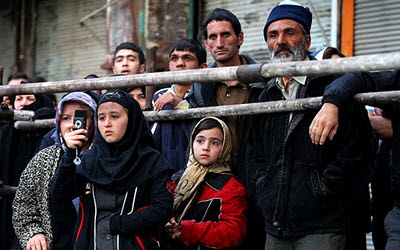Lawyers, government officials, lawmakers and parents of the victim by and large demand public execution for the convict Imran Ali in rape and murder case of 7-year-old Zainab. But isn't it enough to hand over 4 separate death sentences for conviction in kidnapping, rape, murder and terrorism charges?
From the grieving mother of Zainab to Senate, there is a rising consent to publicly execute the convict. The national narrative in mainstream media too suggests it is the only way to stop crimes of child abuse.
Pakistan had lifted a 7-year moratorium on capital punishments after the tragic terrorist attack on a Peshawar school that claimed the lives of 132 children. Executions were resumed for all death penalty offences, not for terror convicts alone.
The call for public hangings, introduced by Gen Ziaul Haq, is primarily raised to make it serve as deterrence for future crimes. But research tells otherwise. In 2016 study titled "The Fall of Capital Punishment and the Rise of Prisons: How Punishment Severity Affects Jury Verdicts", authors Bindler and Hjalmarsson argued that there is no or only little evidence of a deterrence effect of capital punishment. David Phillips studied the deterrent effect of publicized London executions in the latter half of the 19th century to find it has no long-term impact to stop the homicides.
Christopher Kudlac noted in his book "Public executions: The death penalty and the media" that media coverage also influences the demand for executions to be made public, in view of the rising sentiments of hatred against certain cases of crime as happened in Zainab's case. In newsworthy crimes, public sentiments and attitudes change overtime, he wrote.
Despite Pakistan's law not allowing executions to be made publicly, the provincial prosecution in Punjab has suggested to the government that it is possible. The Punjab Assembly is being pressurised by several legislators to pass amendment in the law to make space for the populist demand.
Muhammad Ahmad Pansota, a legal expert, had opined that justice will not be served when the very nature of the punishment is both barbaric and ineffective. Pansota argued that victim's families will be less likely to report crimes related to child sex abuse when the perpetrators are either family members or known to the victim, which happens in a significant number of cases.
Witnessing public executions can have adverse effects on the psycho-social well-being of people, especially children. In 2013, bloggers and civil society in Iran had criticized public hangings when there were reports of children being traumatized psychologically after watching such violence. Symptoms of dissociative disorder emerged in journalists when they witnessed executions, according to American Journal of Psychiatry study.
A study published in Criminal Justice and Behavior concluded that people are likely to reverse their support for death penalty itself after watching the executions, leading to the demand for changes in death penalty policy.
Jimmy Carter writes in his book that execution desensitizes the people to violence and immorality of killing, increasing the probability that some people will be motivated to kill others.
According to Amnesty International report of 2016, public executions were only carried out in 2 countries: Iran and North Korea. It is widely believed that sex education is the only way to curb violent crimes against children. Child sexual abuse is extremely under-reported due to lack of awareness. If Pakistan is to clamp down on such crimes against children, the authorities have to spread awareness about human sexuality, reproduction and adolescence.
Source: dunyanews.tv, February 19, 2018
⚑ | Report an error, an omission, a typo; suggest a story or a new angle to an existing story; submit a piece, a comment; recommend a resource; contact the webmaster, contact us:
deathpenaltynews@gmail.com.
Opposed to Capital Punishment? Help us keep this blog up and running! DONATE!
"One is absolutely sickened, not by the crimes that the wicked have committed,
but by the punishments that the good have inflicted." -- Oscar Wilde












